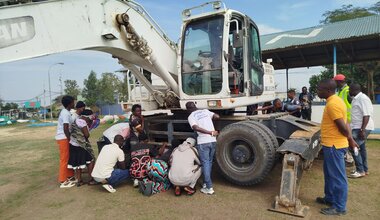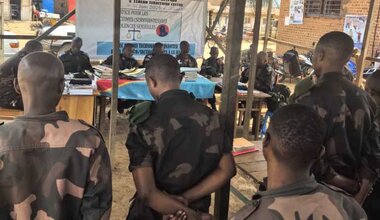HIV/AIDS explained to the Hutu community living in the Walungu transit camp/South-Kivu
Bukavu, 19 August 2015 — MONUSCO/South-Kivu HIV/AIDs section proceeds with sensitization sessions on HIV/AIDs pandemic. On Wednesday 19 and Thursday 20 August, this section met the ex-combatants of the Democratic Forces of the Liberation of Rwanda at the Walungu transit center.
With DDRRR’s facilitation and cooperation, HIV/AIDs session was held in Walungu for the second group of FDLR ex-combatants, awaiting their relocation, after voluntary surrender.
The mode of transmission, the evolution of the pandemic, the methods of prevention, the advantages of voluntary screening as well as the medical and psycho-social care are the issues that were discussed in the Kinyarwanda language with the occupants of the above transit camp. Two hundred six people live in the camp including 48 men, 48 women and 100 under-aged.
For Dr. Jean-Luc Kassa of HIV/AIDs section, the session is part of the missions confided to their Section, under the UNSC Resolution 1983, which, inter alia, outlines the commitment made in favor of universal access to prevention, treatment, care and support regarding HIV/AIDs.
This Resolution entrusts HIV/AIDs section with the mission to carry out outreach activities and indiscriminately provides to everyone the necessary information regarding this pandemic with a view to achieving “zero new infection goal regarding HIV/AIDs” by the year 2020.
Kassa further said the activity consists in “mainstreaming prevention of Sexually Communicable infections (IST) and HIV into the DDR/RR process (Disarmament, Demobilization, Repatriation and Reintegration).” Therefore, similar activities will also be organized in Kamina, Kisangani, Kitona and Kotakoli.
The targeted community was very excited as they listened carefully to the explanations given them; they were allowed to ask questions for clarification on the issues addressed.
At the end of the session, seven people volunteered to go through HIV/AIDs screening. It is worth recalling that similar sessions are also organized for UN civilian and military personnel as well as for members of the Congolese Police and Army.
 ONU
ONU Nations Unies Maintien de la paix
Nations Unies Maintien de la paix




